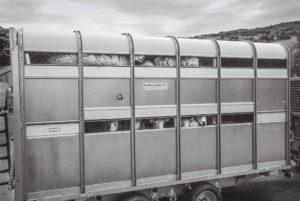 Dolgellau Market, 12th June 2009. ‘It’s a slow start, with a few single and double deck trailers bringing in sheep – lambs, rams, hoggets. Just before noon the auctioneer and his female assistant stroll across the yard ringing a hand bell. They climb up onto a metal platform round the sheep pens (there are no cattle today) and start immediately a rapid patter, numbers and the word “pound” ring out, but the details of the transactions are obscure. He moves quickly from lot to lot, sold as single animals or by the pen.’
Dolgellau Market, 12th June 2009. ‘It’s a slow start, with a few single and double deck trailers bringing in sheep – lambs, rams, hoggets. Just before noon the auctioneer and his female assistant stroll across the yard ringing a hand bell. They climb up onto a metal platform round the sheep pens (there are no cattle today) and start immediately a rapid patter, numbers and the word “pound” ring out, but the details of the transactions are obscure. He moves quickly from lot to lot, sold as single animals or by the pen.’
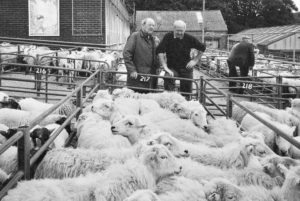 ‘The bids are almost imperceptible and certainly impenetrable. I ask a farmer how prices are. He frowns, “Down this week – £25-27; last month they were up to £37. It’s difficult at these prices. Last year a load of winter feed cost £450, this year it was £980 and concentrates have doubled. We get less and the inputs cost more. The wife finds the same at the supermarket.” He points to the sheep. “See the different markings? They must have the ear tags bought here at 16p, that’s £16 a hundred – it all adds up. Now they want us to have electronic tags and they cost 60p.” The auctioneer moves on.’
‘The bids are almost imperceptible and certainly impenetrable. I ask a farmer how prices are. He frowns, “Down this week – £25-27; last month they were up to £37. It’s difficult at these prices. Last year a load of winter feed cost £450, this year it was £980 and concentrates have doubled. We get less and the inputs cost more. The wife finds the same at the supermarket.” He points to the sheep. “See the different markings? They must have the ear tags bought here at 16p, that’s £16 a hundred – it all adds up. Now they want us to have electronic tags and they cost 60p.” The auctioneer moves on.’
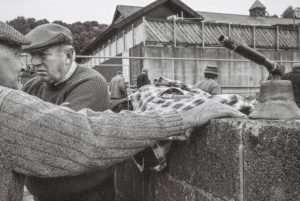 I see occasional messages on Facebook asking if people remember things from the 1950s and 60s. I’m tempted to put up a picture of a cattle market with the same question. Livestock markets were once part of the life, of the weekly and seasonal rhythms, for most towns and cities. In East Anglia they are now virtually extinct as farming has become almost exclusively arable. Elsewhere, if they have not closed they are increasingly relegated to sanitised, out of town sites, and health and safety discourages casual visitors. Stock is often now sold direct from the farm without coming to market. The Dolgellau farmer agreed that ‘the markets are getting fewer and fewer’.
I see occasional messages on Facebook asking if people remember things from the 1950s and 60s. I’m tempted to put up a picture of a cattle market with the same question. Livestock markets were once part of the life, of the weekly and seasonal rhythms, for most towns and cities. In East Anglia they are now virtually extinct as farming has become almost exclusively arable. Elsewhere, if they have not closed they are increasingly relegated to sanitised, out of town sites, and health and safety discourages casual visitors. Stock is often now sold direct from the farm without coming to market. The Dolgellau farmer agreed that ‘the markets are getting fewer and fewer’.
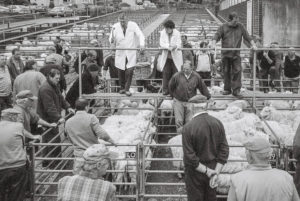 This is an exemplar of the increasing separation between town and country, the dissolution of an ancient co-dependency. There is ‘a loss of knowledge about the natural world and a growing isolation from it.’ The mass of the population has no real understanding of the meaning of rural life – countryside leisure and commuting from village to town are not the same thing. It’s another world, the one captured in the Show of Hands’ angry, elegiac anthem ‘Country Life’ (2003).
This is an exemplar of the increasing separation between town and country, the dissolution of an ancient co-dependency. There is ‘a loss of knowledge about the natural world and a growing isolation from it.’ The mass of the population has no real understanding of the meaning of rural life – countryside leisure and commuting from village to town are not the same thing. It’s another world, the one captured in the Show of Hands’ angry, elegiac anthem ‘Country Life’ (2003).
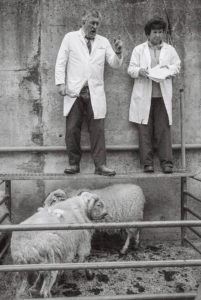 It’s the loss too of a very direct connection with our food. We consume without thinking about where what we eat comes from and the human, animal and environmental cost of its production. Standing by livestock market pens assailed by lowing, bleating and grunting, the air redolent of the basics of animal life may not turn you into a vegetarian, but it brings home what eating meat really means.
It’s the loss too of a very direct connection with our food. We consume without thinking about where what we eat comes from and the human, animal and environmental cost of its production. Standing by livestock market pens assailed by lowing, bleating and grunting, the air redolent of the basics of animal life may not turn you into a vegetarian, but it brings home what eating meat really means.
Photos: Dolgellau, Wales, June 2009
